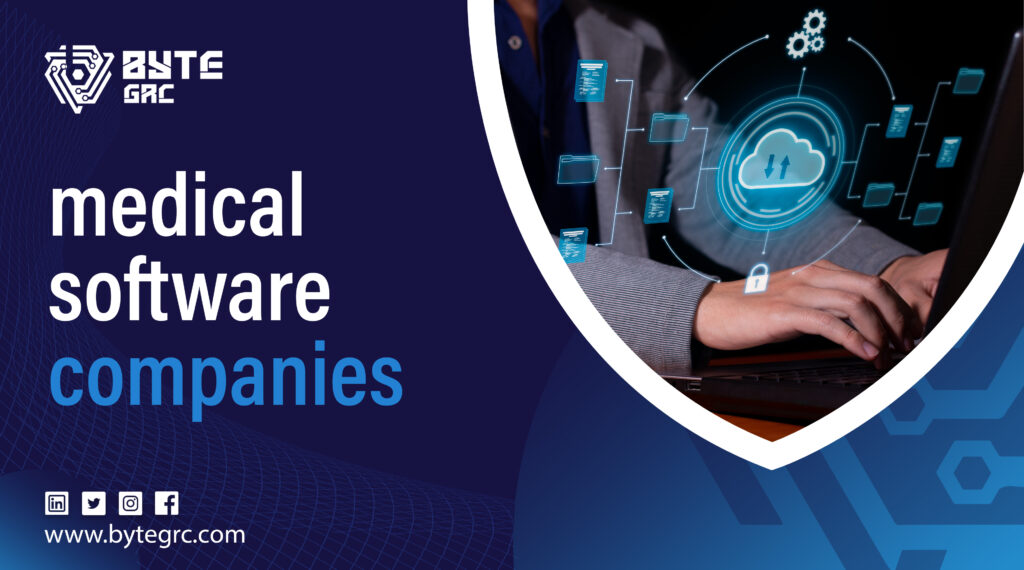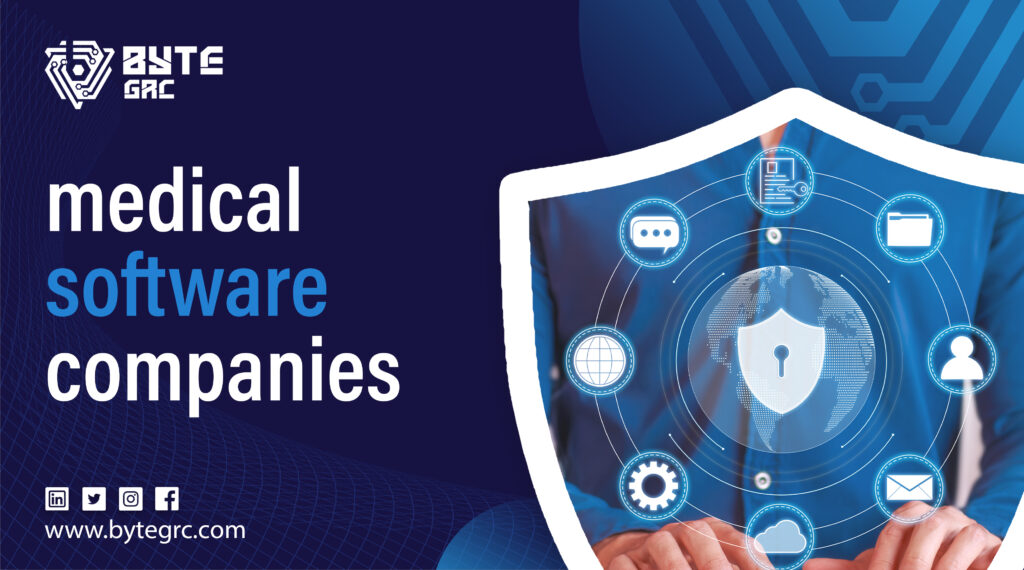
Table of Contents
Top 25 Medical Software Companies in 2025: Innovating the Future of Healthcare
In this era of AI and technology, medical companies have to stay updated as well, its not just an option any more, it’s a necessity now. If companies are not updated, they can’t provide the right help to the right people.
Imagine, if 911 wasn’t a thing, how would have people called for emergency services if the fire, health, electric department were far away. So, with the world advancing and stepping into a new era company especially healthcare companies also have to stay updated with the people and technology.
What Exactly Is Medical Software?
Medical software is the backbone of modern healthcare systems. It refers to digital platforms, tools, or applications used by healthcare providers to diagnose, monitor, treat, and manage patient care. It also includes the software embedded in medical devices and tools used for operational efficiency in hospitals and clinics.
Broadly, medical software is categorized into:
- Clinical software – EHRs, imaging systems, diagnostic platforms
- Administrative software – Billing, claims, workforce scheduling
- Analytical tools – AI-driven insights, population health management
- Compliance and risk management – HIPAA tools, audit tracking
At its core, this software helps bridge the gap between patient data, clinical decisions, and organizational efficiency. In a world increasingly driven by data and compliance, medical software companies are not just IT vendors—they’re mission-critical partners in patient care.
What Do Medical Software Companies Do?
Top medical software companies serve the healthcare sector by designing and delivering technology solutions that:
- Automate manual workflows: Patient intake, diagnostics, claims management
- Ensure compliance: Meet HIPAA, FDA, HL7, and other regulatory standards
- Empower clinical decision-making: Using AI, analytics, and real-time monitoring
- Enhance patient outcomes: Through tailored care plans, telehealth, and engagement tools
- Improve operational efficiency: Reducing overhead, optimizing staff, minimizing error
Whether it’s a hospital network, clinical trial organization, or pharmacy benefit manager, these companies play a crucial role in streamlining operations and delivering better care.
How Do Medical Companies Test Their Software?
Developing a tool for healthcare isn’t like building a regular app—it’s life-critical. That’s why software testing in the medical space is rigorous and highly regulated. Here’s how they do it:
- Requirements Traceability Matrix (RTM): Ensures every software requirement is tested
- Unit Testing: Each individual module is tested for accuracy
- System Integration Testing: Ensures compatibility across systems like EHRs, LIS, PACS
- Validation & Verification: Verifies the software meets its design and complies with medical standards
- Simulated Clinical Scenarios: Real-world use cases tested in a controlled environment
- Regulatory Audits: FDA (510(k)) for the US, CE marking in the EU
- Penetration Testing: To test for cyber vulnerabilities in patient data and system access
- Usability Testing (IEC 62366): Ensures intuitive use to reduce human error
For any software that interacts with patient care or devices, testing can stretch across months or years before launch.
How Do Medical Companies Protect Their Software?
Security is non-negotiable when you’re handling Protected Health Information (PHI). Here’s how these companies secure their platforms:
- HIPAA and HITECH Compliance
- Data Encryption: At-rest and in-transit using AES-256
- Access Controls & Audit Trails
- Role-Based User Authentication
- Regular Security Patching & Updates
- Vulnerability Scans & Pen Tests
- Secure APIs for third-party integrations
- Zero Trust Architecture for internal access
- Cloud backups and Disaster Recovery planning
In a time of ransomware attacks and data breaches, medical software providers prioritize cyber-resilience to maintain trust with patients and providers.
Top 25 Medical Software Companies in 2025
Below is a curated list of the top medical software companies leading the digital healthcare revolution in 2025, along with links to their official websites:
1. CorroHealth
A leader in clinical decision support, coding automation, and revenue integrity solutions for large healthcare organizations.
2. Accolade
A human-centered platform combining telehealth, navigation, and benefits management for large employers and health plans.
3. WellSky
Focused on post-acute care, WellSky offers powerful software for home health, hospice, rehabilitation, and social services.
4. Lumeris
Empowering value-based care through its population health management software and services.
5. Certara
A global player in biosimulation, clinical pharmacology, and regulatory science software.
6. Tebra
Born from the merger of Kareo and PatientPop, Tebra offers a comprehensive practice management and patient experience platform.
7. Edifecs
Known for interoperability, compliance, and data exchange tools, especially in payer ecosystems.
8. Relias
Provides learning management systems (LMS) for healthcare education, compliance, and clinical training.
9. Suvoda
Offers IRT (Interactive Response Technology) solutions for managing complex clinical trials globally.
10. PatientPoint
Engages patients at the point of care with personalized education platforms and digital waiting room content.

11. PartsSource
Combines procurement software and a cloud-based marketplace for medical equipment parts and services.
12. AssistRx
Streamlines prior authorizations, hub services, and e-prescribing to accelerate therapy initiation.
13. Nference
Applies machine learning to unstructured data in EHRs and clinical documents to surface insights for R&D.
14. Kipu Health
A specialized EHR and CRM system for behavioral health and addiction treatment centers.
15. Nym Health
Revolutionizing medical coding with its AI-driven autonomous coding engine, improving claim accuracy and speed.
16. Capital Rx
Transforming pharmacy benefits with transparent pricing and a modern pharmacy benefits platform (JUDI™).
17. Prescryptive Health
A mobile-first prescription intelligence platform that empowers patients with price transparency and access control.
18. kontakt.io
Provides IoT-enabled RTLS (Real-Time Location Services) for hospitals, helping track assets, patients, and staff.
19. PharmaCord
A patient services provider offering compliance support, benefits verification, and patient engagement tools for pharma companies.
20. Vizzia Technologies
Specializes in workflow optimization and asset management using location-based analytics in clinical environments.
21. Nextech
An integrated platform offering EHR, PM, and billing software for specialties like dermatology, ophthalmology, and plastic surgery.
22. Spok
Provides clinical communication platforms, ensuring fast, secure, and reliable communication across care teams.
23. Viz.ai
Uses AI-powered imaging software for stroke detection and rapid triage, integrating directly with hospital systems.
24. Clearsense
Delivers data management and governance platforms for transforming healthcare data into actionable intelligence.
25. Bluesight
Focused on medication intelligence, their platform uses AI to ensure safer, smarter pharmaceutical decisions.
Conclusion
The digital health space is evolving fast, and these 25 medical software companies are setting the pace. From AI-driven diagnostics to clinical trial orchestration and revenue cycle management, they’re solving some of the industry’s most pressing challenges with agility, security, and innovation.
Whether you’re a hospital CIO, medical startup founder, or health tech investor, keeping track of these companies can help you stay ahead in the race for smart, secure, and scalable healthcare.
FAQ
Q1: What is the difference between medical software and healthcare software?
Medical software often refers to tools with a direct impact on patient care, like diagnostics or EHRs. Healthcare software includes broader systems such as administration, HR, or benefits platforms that support the industry but aren’t necessarily clinical.
Q2: Is FDA approval required for medical software?
Only if it qualifies as Software as a Medical Device (SaMD) under FDA guidelines. Most clinical and diagnostic platforms require approval or clearance via 510(k) submissions.
Q3: Can small clinics afford advanced medical software?
Yes. Many providers like Tebra and Nextech offer scalable, cloud-based models with subscriptions suited for smaller practices.
Q4: How does AI improve medical software?
AI enhances everything from radiology diagnostics to billing accuracy. Companies like Viz.ai and Nym Health are pioneers in integrating AI to reduce errors and speed up decisions.
Q5: Are all these platforms cloud-based?
Most modern medical software companies have moved to cloud-first architecture for better scalability, security, and interoperability.
